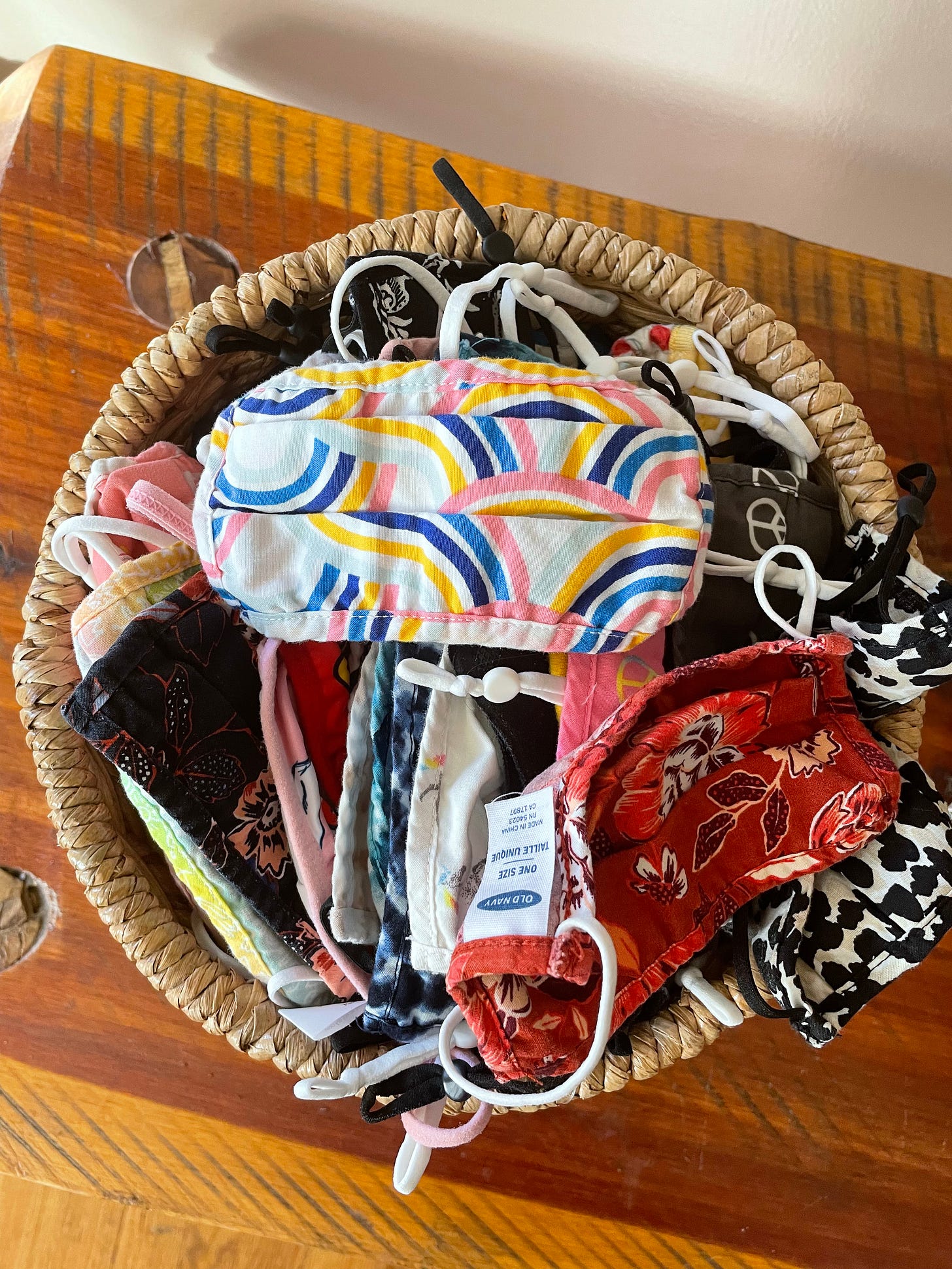How We Are Changed: Pandemic (Recovery) Diaries #3
If we could wave to our former selves from afar, who would we see?
{This is part #3 in a sporadic series called the Pandemic (Recovery) Diaries.}
How are we changed? We back up now without even thinking. We subconsciously calculate six feet without a single yard stick. We remember our masks almost always before leaving home. We wash them regularly or toss the disposables we find smashed in the crevices of our car. And these sights aren’t at all strange to us, like they were in March of 2020.
We lean our torsos over the receptionists’ desks so they can snap at our foreheads with a digital wand. We don’t flinch (or we do) when an especially aggressive receptionist takes a rather gun-shaped wand to our head and clicks without warning. (Hello, New Jersey.) We’ve learned, in a pandemic, how to monitor our bodies for the non-Covid ways our bodies can fall apart.
We learned to try for intimacy while looking into the pinhole camera of our laptops, so that the person on the other end would feel connected to us. Even though it meant we warmly nodded at a black dot. We loved from afar, which sometimes didn’t feel like love.
We said yes to plans and got hopeful, and then they said no. Or we said no, or they said virtual, which felt like no, because we were—are—desperate to be in the physical presence of others. We are used to this. We are not used to this.
No, this what I mean: We are not used to being used to this.
I keep wanting someone to step in and explain all of us to ourselves. Quick, psychologists, psychiatrists! Tell us: How has the pandemic changed us? Not collectively, as a society. This we can see. But individually, on the inside? How are we being rewritten?
I came across the following headline: The Pandemic Has Changed Me. You’re Different Too, Whether You Realize It or Not. The writer stumbled just as I am. Towards the end, he concluded with a quote from psychology professor, Sumithra Raghavan:
We often process things after the fact, but there’s no after the fact. We’re still in it. We’re still putting out these fires. Until we are done, we can’t reflect on and meaningfully understand what it has done to us.
Okay. But I seek some clarity, even in the midst. We look in the mirror and wonder, would these new lines have encircled our eyes without Omicron, Delta, Alpha? Would this blood pressure measure high without the country mapped in shades of purple and red, like some painter obsessed with the same valentine colors. Am I forgetting this phone number, this errand, my ex-boyfriend’s name, because I’m now in my 40s, 50s, 70s, or because I’m spending a few inches of brain matter researching boosters each day?
Our children can make friends through partitioned clear plastic. Our teachers have learned to teach three different ways in under three years: remotely, and then hybridly, and then in-personly—with a dance of antiseptics. These are gains, but they also cost. The losses are both ginormous and miniscule. One of my students said she really, really misses indoor dining. Another said he misses his father. We see dog-walkers and don’t think twice when, out of kindness, we cross to the other side of the street. We wave from afar.
If we could wave to our former selves from afar, who would we see? What would we notice? How have we changed?
It’s hard to know from the inside. But I think we can still try.
Christmas of 2020, my extended family gathered outdoors for an hour or two, unwrapped gifts six feet apart on lawn chairs in near-freezing weather, in fleece pants and down jackets, with numb fingers. And we called this cheer. Look at us! Doing Christmas! Adapting! Was it sad? A human triumph? It was both.
This year, we gathered indoors, in warmth, around fires, holding cocktails, unmasked and boosted and rapid tested. We spent hours and in some cases days together. Glorious days. Even for us introverts.
This is one way I know I’ve changed. What’s your favorite holiday? people ask, and I’d always shrugged off the Thanksgiving fans. Seriously? Just food and gathering? No presents? Gravy a sexy holiday does not make.
But now I get it. Being together. Being in the same room. Seeing one another’s full faces. Breathing the same air. Feeling the heat of one another. What a risk, what a need. What a gift. I don’t think I’ll ever see it the same way again. I hope I never, ever take it for granted again.
What about you? What’s one way you know you’ve changed?
A note on this post: In the spring of 2021, before Delta but after my two Moderna jabs, I started a newsletter series called Pandemic Recovery Diaries. Remember that glorious month of June? Vaccinated folks didn’t spread the virus, we’d heard. I actually walked into a store without a mask. And because the virus was, I thought, creeping into our rearview mirror, I had the perspective to get curious about all the ways the past year had worn us down… and how we might gently build ourselves back up.
You know the rest: Delta. Omicron. Can you recover from something you’re still very much in? I don’t know. Probably not fully. But maybe partially? Maybe the same way you can recover from a work week by taking a weekend, even though Monday is around the bend? Hence: My “Pandemic Recovery Diaries” have become “Pandemic (Recovery) Diaries.”
Want to read a little more pandemical processing? Here’s a piece I wrote for TIME, about taking Fiona to a baseball league for kids with disabilities. (Hallelujah, our first extracurricular activity in over a year!) It’s called: We Don’t Have to Be SuperHuman: A Big Lesson from My Daughter’s Little League.




